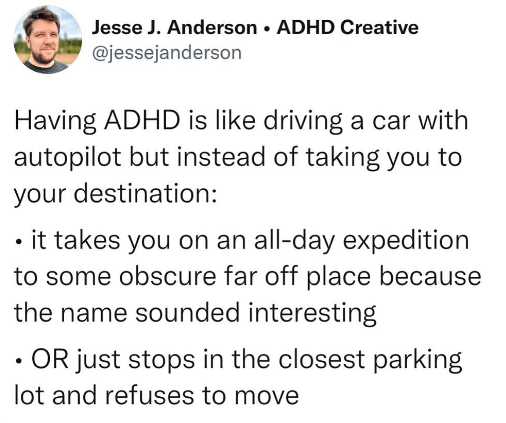Vroom vroom, am I right?
Driving is a thing that legitimately terrifies me. You’re basically driving a 5,000-pound bullet that can liquify you if you’re not careful enough while also trusting that dozens of other people on the road are intelligent enough not to smash you into bits.
And then you add ADHD into the equation…aaaaaah. It’s no wonder that it’s an activity that terrifies so many of us, and it really sucks that there’s sometimes no escaping it.
Well, then the only thing we can do is our favorite: meet the problem head on and beat it on our own terms 💪
So, buckle up cause we’ll be learning a lot of thingamajigs tonight, such as:
- How does ADHD impact driving skills?
- Is driving with ADHD dangerous?
- What should we do on the road to minimize distractions?
- How to prepare for driving?
And a few things more.
You ready?
Let’s go! 🚗
[ADHD Impact on Driving] ADHD and Its Impact on Driving Skills
Like with any aspect of life, ADHD has this propensity to affect how we think, feel, and experience the world.
Driving - a process that requires complex hand-eye coordination and engagement of many of our senses - really, really isn’t an exception.
So, how exactly does ADHD affect our brain?
Focus and Attention
The most significant challenge in ADHD is maintaining consistent focus. On the road, this translates to difficulty sustaining attention, which is crucial for monitoring surroundings and responding to changes.
Impulsivity
You can check your phone while on the road, right? WRONG. I mean, it is really wrong, but ADHD can make it difficult to resist the temptation to reply to a text, which can lead to some unfortunate… circumstances.
Processing Speed
ADHDers can also have issues with information processing. This delay can be critical in situations that require quick responses, like reacting to a pedestrian who crossed the street at the wrong time or other drivers not doing their best. Suffice to say, that Inattentive ADHD and driving don't really mix.
Distractibility
External stimuli, like billboards or a busy roadside, can easily divert attention from driving tasks. Internal distractions, such as wandering thoughts, can also impact driving focus. Together, they mean that ADHD drivers are more prone to get into accidents, which can further put you on edge and contribute to driving anxiety.
Difficulty in Consistent Vehicle Control
Maintaining a steady speed or consistent lane position requires ongoing attention, which can be challenging for someone with ADHD.
Risk-Taking Behaviors
A tendency towards risk-taking in ADHDers can manifest in dangerous driving habits, such as speeding or aggressive driving, or trying to overtake when you really shouldn’t have to.
Implications for Daily Driving

Right, so we have looked at most things that can go wrong for ADHD drivers. But what are the actual consequences, right?
I can just say, “Oh, you’re more likely to crash a vehicle,” but while that’s true, it’s also not saying that much.
Otherwise, ADHDers would be barred from getting a license in the first place (which is not true).
So, what are the more specific consequences that we should be on the lookout for?
- Routine Commutes: The repetitive nature of daily commutes can make you zone out and lose focus, thus putting ADHD symptoms to the forefront.
- Long-Distance Driving: What do we know about long, intercity commutes? Drivers are tired, exhausted, and frustrated - all things that can exacerbate attention difficulties, requiring strategies to maintain focus over extended periods.
- Impact on Confidence: driving is something that a lot of people do. And, oftentimes, it’s something that you have to do. So, struggling with another aspect of “normalcy” can be a real blow to self-confidence as you struggle to reconcile with your unearned difficulties.
[Legal and Safety Considerations] Driving with ADHD: Legal and Safety Considerations
Wait…did you just say legal? Also, why are you talking to yourself in the third person?
I mean, yes, believe it or not, but depending on specific circumstances, there can be actual legal ramifications for ADHD driving. That’s right: ADHD is a crime now! Off to jail with you, citizen 👮➿…
Ahem…I got a bit carried away there.
But no, it’s a bit more nuanced than that. So, let’s look at specifics, and while we’re at it, let’s also take a gander at safety considerations for ADHD drivers in general.
Legal Considerations for Drivers with ADHD
The law treats drivers with ADHD like any other driver, but there are important considerations that are worth mentioning.
Disclosure: again, I’m not a lawyer, just a silly ADHDer 🥺So if you need to know with 100% certainty, seek proper legal counsel.
Depending on the severity of symptoms and the effectiveness of treatment, ADHD can sometimes influence the process of obtaining or retaining a driver's license.
In some regions, drivers might be required to disclose their ADHD diagnosis, especially if it could impact their driving ability. That’s true, for instance, in the UK, where you need to disclose your ADHD if you believe that it has the capability to disrupt your driving ability.
While the United States doesn’t have this expectation, ADHD diagnosis might be a losing play during disputes. For example, if you cause an accident, you might have a harder time defending your cause as you knowingly drove a car while having a condition that makes you more of a liability on the road.
ADHD-Related Driving Risks: Facts and Statistics
But is this assertion true, or is it just another incident of the ADHD-based discrimination we so commonly experience?
- Increased Accident Rates: Studies show that individuals with ADHD have a higher risk of being involved in traffic accidents.1
- Violation Tendencies: There's also an increased likelihood of traffic violations among drivers with ADHD, including speeding and failing to obey traffic signals.
Importance of Safety and Awareness
Knowing these peculiarities of ADHD symptoms and how they can impact driving ability, it’s therefore important to take all of the necessary precautions
Being aware of ADHD-related driving challenges is key to safety.
- Proactive Risk Management: Understanding personal ADHD challenges can help develop strategies to mitigate risks, such as planning routes with fewer distractions or driving at less busy times.
- Continual Awareness: Staying mindful of how ADHD symptoms might impact driving behavior is essential. This awareness can lead to safer driving habits and decisions.
[Practical ADHD Driving Tips] Strategies for ADHD

Now that we have figured out all the dangers, spooks, of ADHD and driving anxiety, let’s figure out what we can do about it…not to crash and stuff, you know?
Reducing Distractions Inside the Vehicle
Minimizing distractions is crucial for drivers with ADHD. Keep the car interior simple and clutter-free. Avoid having unnecessary items that could catch your attention while driving.
And that includes clutter in your mind as well. Look, as much as you might love our totally awesome Numo app - or anything else - it’s not something you should be leaning on too much, especially if you have issues with focus. While navigation tools are helpful, unnecessary technology use, like phones or complex entertainment systems, should be minimized or avoided while driving.
Improving Focus and Concentration
Enhancing focus is key to safe driving for those with ADHD. Regularly check mirrors and speed to create a habit of active driving, which can help maintain focus. Doing these “shake-ups” on the regular reduces the odds of you going on the autopilot. Just make sure that you switch up the patterns after some time. Otherwise, it becomes just yet another “autopilot.”
Also, even before you start, you should try some mindfulness techniques. Before starting the car, simple mindfulness or breathing exercises can help center your attention and prepare you for the drive.
Managing Impulsivity and Emotional Regulation
Emotional regulation is another thing worth mentioning. Impulses to do…something you shouldn’t like driving too fast, overtaking when you don’t need to, or replying to that text.
So, take a moment to sort these things out by first acknowledging your impulses. Recognize the urge to make sudden driving decisions, like abrupt lane changes, and consciously choose safer actions.
And it is worth reiterating: try to stay calm and collected. Practice techniques to remain calm in stressful driving situations, such as being cut off by another vehicle or encountering heavy traffic.
Strategies for Long Drives
Long drives are like boss battles of ADHD driving because of a simple math equation: the longer the drive goes on, the more opportunities there are for you to become distracted or zoned out.
So, one way to circumvent that is by planning for breaks. Schedule regular breaks during long drives to rest and refocus, recharge…and maybe sneak in a few snacks 👀
Just don’t overdo it on the coffee.
There is also something to be said about engaging your mind to minimize zoning out. It’s kinda…it may sound counterintuitive, but some ADHDers do find relief and increased focus by listening to white noise or audiobooks.
Experiment with your tolerance and effectiveness so it doesn’t become a detriment. Remember, ADHD is not created equal.
Coping with Stress and Anxiety
And, just in general, making sure that your stress and anxiety levels don’t shoot up into the stratosphere is important. Even after you take all precautions and safeguards, ADHD driving is stressful.
Engage in relaxation techniques before starting the car, especially if feeling anxious or stressed, and remind yourself of your ability to drive safely and manage your ADHD effectively.
[How to Prepare for the Road] Preparing for the Driving Experience
Aight. We understand the dangers; we’ve read the precautions…is there anything else we can do? After all, establishing a pre-driving routine can enhance focus and safety.
- Checklists: Create a pre-driving checklist that includes adjusting mirrors, checking fuel levels, and setting up navigation if necessary. This routine helps in transitioning into a driving mindset.
- Physical Preparation: Ensure you are physically ready to drive. Being well-rested, hydrated, and comfortable before starting the car - I know. It’s not always possible. But at least for long treks, ensure you’re feeling your best…otherwise, you’ll be taking many breaks.
- Route Planning: Familiarize yourself with the route beforehand. Knowing where you’re going reduces the need for last-minute decisions.
- Time Management: Allow extra time for your journey. This reduces the stress of being late, which can exacerbate ADHD symptoms.
- Weather Considerations: Adjust your driving style for weather conditions like rain, snow, or bright sunlight.
- Traffic Adjustments: In heavy traffic, focus on maintaining a safe distance and avoiding rapid lane changes.
[Training for Driving with ADHD] Training and Professional Assistance

Man, we’ve written a lot of stuff…. It sounds like a lot to tackle by yourself.
Which is an obvious cue that you really shouldn’t. ADHD isn’t something you have to go through alone. Whether friends, family, kind strangers, or professionals, we must take care of each other.
So, let’s look exactly at how we can accomplish that…driving edition.
Role of Specialized Driving Instructors
Choosing the right instructor can make a significant difference.
Look for driving instructors with experience or training in working with individuals with ADHD. These can provide tailored instruction that addresses specific challenges. An initiative called Behind the Wheel with ADHD has actually assembled a list of driving schools that are ADHD certified, so you can look for one in your state.
Specialized instructors can offer focused sessions on areas of difficulty, such as maintaining attention, managing impulsivity, or handling high-pressure driving situations.
So what exactly are you going to learn at one of those?
- Defensive Driving Courses: These courses teach skills to anticipate and respond safely to potential hazards and are particularly useful for ADHD drivers who may struggle with impulsivity or quick decision-making.
- ADHD-Specific Driving Programs: ADHD driving courses are specifically designed to address the challenges faced by ADHDers, offering strategies and practices tailored to their needs.
Working with Therapists or Coaches
And, as always, it would be remiss of me not to shout out the GOAT: therapy and coaching. Of course, I don’t want to tell you that it works for everyone, bu-u-ut research seems to suggest that CBT can be quite successful for ADHD enjoyers.3
So, I’d say it’s a worthwhile consideration, especially if you’re also suffering from anxiety or depression that, too, can impede your driving ability.
In addition to CBT therapy, you may also seek a specialist who excels at ADHD coaching. Coaches specializing in ADHD can offer strategies for better focus and organization, both crucial for safe driving.
Community Resources and Support Groups
At Numo, we always emphasize the importance of community for many reasons. First of all - it’s fun to share memes and woes with fellow ADHDers, people who truly get you.
But the most important part here is the holy mantra: ADHD diagnoses aren’t made equal. Your ADHD symptoms might be completely different from those of a person sitting right beside you. But the truth is that you both will have true and valid ADHD.
And research is still playing catch-up on that front, so it sometimes falls behind the observable truth. Not because “science is bad,” mind. But more so because proper research takes time!
For instance, there hasn’t been much research done on the effectiveness of body doubling for ADHD. Yet, the anecdotal experience proves that it can be an effective aide that boosts your productivity.
So, where am I going with all of this?
The community can often have answers that no one else does. In many experiences, you can find someone who has gone through similar issues as you do, and they can help you…or you can help them!
That’s why we have created Numo! Although it’s many things - a pretty damn good ADHD planner, for one - I’d like to think that our communities - our squads and tribes - remain its most important, killer feature.
You can exchange stories, ask questions, share memes, and, hopefully, find some awesome tips on how to master ADHD driving.
If that sounds enticing…then hop on in! We’d be lucky to have you!
[Conclusion] Conclusion
That was…a long drive! (ehehehehehe…sorry)
But we’ve finally reached our final destination!
So, is driving hard with ADHD?
Ultimately, driving with ADHD is pretty much like any other ADHD activity - you have to wrestle with your attention span, constant distractions, and risk-taking obsession to get where you need to be.
The only caveat here - and quite an important one - is that goofing up while driving can have…terrible consequences. Which is why it’s so crucial to take it seriously!
But if you take all the precautions, you’ll see that driving with ADHD is not as scary as it might seem at first glance.
And if you’re ever unsure about it, our Numo family will always be here to give you a ride! 😉
See you around 👋
Sources
1 ADHD Rep. Expert Recommendations for Improving Driving Safety for Teens and Adult Drivers with ADHD
2 Journal of Neural Transmission. Driving and attention deficit hyperactivity disorder
3 Cochrane Library. Cognitive‐behavioural interventions for attention deficit hyperactivity disorder (ADHD) in adults
.-min.png)










